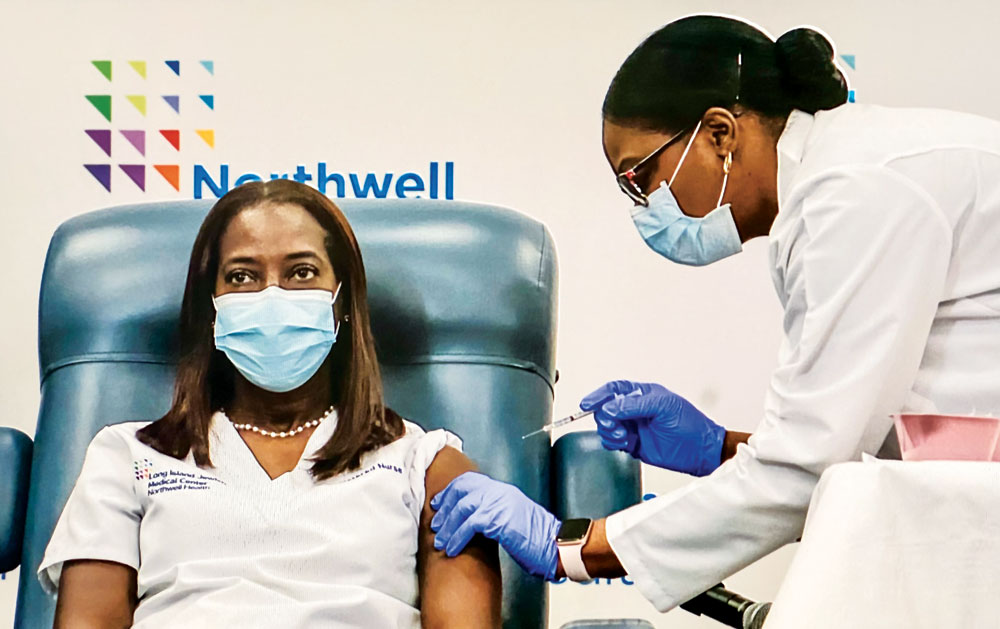
This now iconic photo of the first vaccine in the U.S. symbolizes the beginning of a path back to normalcy. The vaccine went to Sandra Lindsay, a nurse at Long Island Jewish Medical Center on Monday, Dec. 14. She was inoculated with the Pfizer-BioNTech Covid-19 vaccine by Dr. Michelle Chester in Queens, NY. Ms. Lindsay, who has treated patients throughout the pandemic, said she hoped her public vaccination would instill confidence that the shots were safe. “I have seen the alternative, and do not want it for you,” she said. “I feel like healing is coming. I hope this marks the beginning of the end of a very painful time in our history.” Pool photo by Mark Lennihan
![]()
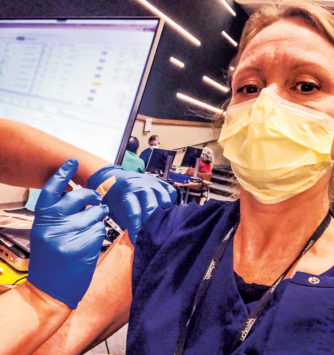
UC Health nurse Dori Buese, who has been on Covid duty since March, got a photo of herself being vaccinated to show her kids. Photo courtesy of Dori Buese
Central Park resident Dori Buese says it felt “surreal” when she received her vaccination. Buese, who has been a nurse with UC Health for 26 years, has been on the frontlines of the pandemic since March when her orthopedic unit transitioned to Covid-19 duty. For weeks during the initial spike of cases, the mother of three went through an elaborate decontamination process when she returned home from work: undressing in the garage, wrapping a towel around herself and running to the basement where she would shower and sleep. Getting the vaccination filled her with feelings of relief and hope. “I now just want everybody to get the vaccine so our lives can get back to some normalcy.”
UC Health physician Dr. Deborah Saint-Phard agrees. “We’ve been thinking about and hoping for this day for so long. I just want to say thank you to all the researchers who have been toiling all around the world to get this into my arm. Into all of our arms.”
![]()
![]()
Saint-Phard says she was surprised at how efficient and orderly the vaccination process was run. After receiving the shot, she downloaded a smartphone app, set up by the Centers for Disease Control, which sends her regular messages checking for any side-effects. So far neither Buese nor Saint-Phard have had any. They will each receive their second shot in early January.
While the December distribution of more than 150,000 doses to healthcare workers and long-term care residents in Colorado went fairly smoothly, many questions remain about whether the vaccine supply will keep pace with demand. And will it be distributed effectively to rural communities and urban clinics serving at-risk populations? Will enough people agree to get vaccinated? Colorado has traditionally ranked low for childhood immunizations—in fact, it had the lowest vaccination rate in the nation for kindergarten-aged children last year.
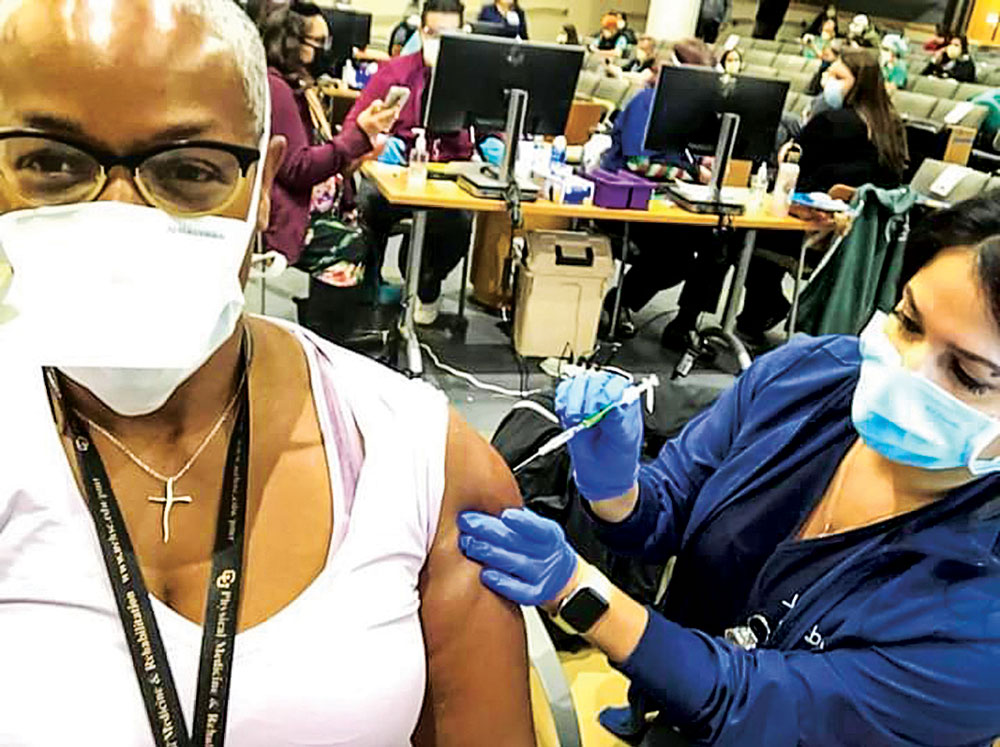
Dr. Deborah Saint-Phard received her first dose of the Pfizer vaccine at the Schroffel Auditorium at the University of Colorado Hospital in mid-December. She has volunteered to help administer the vaccine, since so many nurses and medical assistants have been diverted to help care for Covid-19 patients. Photo courtesy of Dr. Deborah Saint-Phard
State officials say they will begin a robust education campaign to overcome any fears. Doug Farmer, who heads up a trade group representing nearly 300 nursing homes and assisted-living communities in Colorado, says long-term care facilities will have to be diligent in educating the very diverse population of their caregivers in order to overcome any cultural or language barriers that may cause them hesitancy. “We’ll make sure residents and their families know about the safety of the vaccines.” The phase one vaccination process is bringing much needed relief, he says. “It’s been heartbreaking to tell residents to stay in their rooms, that they can’t see their families in person. The social isolation has been very difficult.”
Many in the African American community are especially wary of the vaccination since historically that population has been used—against their knowledge or will—for medical experiments. Saint-Phard says she understands the wariness. “But this is different than the Tuskegee experiment. This is different than other cases where Blacks have been used literally as guinea pigs for experimentation. This vaccine has been tested on tens of thousands of people. I’m not the first person to get this vaccine.”
Saint-Phard added that it’s incumbent on everyone who gets the vaccine to speak out about its safety and urge others to get it when it is offered. She also hopes that since African Americans have been disproportionally affected by Covid-19, that they will get higher priority access to the vaccine.
Determining that priority list in phase two of the vaccine distribution remains a bit of a mystery. State health officials have not released details about who qualifies as “essential” and in what order they should be vaccinated. University of Colorado Health internist and professor of bioethics Dr. Matthew DeCamp says that it will likely become contentious. “The ethics concern is that people are likely to disagree about what counts as ‘essential.’ We tend to rely on political processes to make that determination, which are messy and very divided at the moment.”
Survey Outcome: Will you get the vaccine?
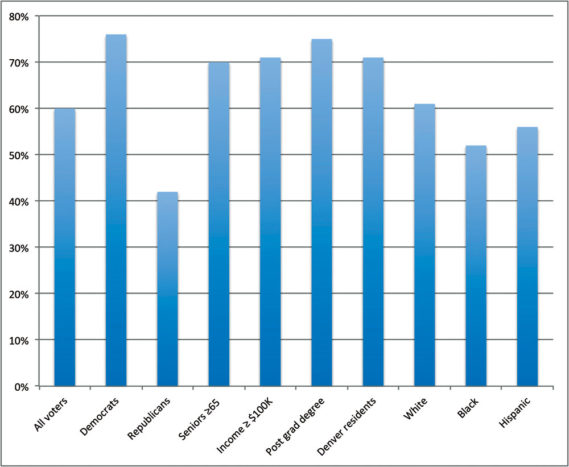
These findings are from a Nov. 18 to Nov. 24 survey by Magellan Strategies and Keating Research. It was a text and online panel survey of 1,008 Colorado voters who participated in the 2020 general election. The data for “all voters” has a margin of error of +/- 3.09% at the 95% confidence interval. Responses by population subgroup have higher margins of error. This survey was weighted to reflect the voter turnout demographics of the 2020 general election in Colorado. It was commissioned by Healthier Colorado.
![]() Another thorny issue that is likely to arise during phase two is whether employers will mandate that employees get the vaccination. The federal Equal Employment Opportunity Commission recently released guidelines saying employers may institute a vaccination requirement, with some exceptions. Ethicist DeCamp says he thinks in this first phase, most healthcare facilities will strongly encourage vaccination but won’t require it. “It does raise issues over the idea of liberty. Some people may think if they are forced to get a vaccine, that infringes on their liberty. But getting the vaccine will actually give people more liberty and freedom to do things—so it’s a trade-off over different kinds of liberty.”
Another thorny issue that is likely to arise during phase two is whether employers will mandate that employees get the vaccination. The federal Equal Employment Opportunity Commission recently released guidelines saying employers may institute a vaccination requirement, with some exceptions. Ethicist DeCamp says he thinks in this first phase, most healthcare facilities will strongly encourage vaccination but won’t require it. “It does raise issues over the idea of liberty. Some people may think if they are forced to get a vaccine, that infringes on their liberty. But getting the vaccine will actually give people more liberty and freedom to do things—so it’s a trade-off over different kinds of liberty.”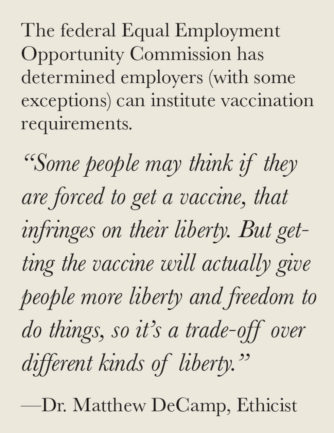
Despite the optimism the vaccine has delivered, health professionals warn that the public cannot abandon safety measures for many months to come. It’s unknown whether a person who has been vaccinated can spread the virus, so mask-wearing and social distancing will still be necessary well into summer.
Under Colorado’s three-tiered approach to Covid-19 vaccinations set forth by the Colorado Department of Public Health and the Environment, phase two, which includes essential workers, people with chronic health conditions, and anyone over 64, isn’t expected to begin until spring. Phase three, which includes everyone else age 18-64, will likely begin early summer. Children have not yet been approved for the vaccine.


0 Comments